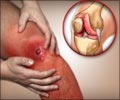Among overweight and obese adults with knee osteoarthritis, intensive diet-exercise combo led to less knee pain and better function after 18 months than diet-alone and exercise-alone.

Stephen P. Messier, Ph.D., of Wake Forest University, Winston-Salem, N.C., and colleagues conducted a study to determine whether a 10 percent or greater reduction in body weight induced by diet, with or without exercise, would reduce joint loading and inflammation and improve clinical outcomes more than exercise alone. The randomized trial was conducted between July 2006 and April 2011. The diet and exercise interventions were center-based with options for the exercise groups to transition to a home-based program. The study included 454 overweight and obese older community-dwelling adults (age 55 years or older with a body mass index of 27-41) with pain and radiographic knee OA. The interventions consisted of intensive diet-induced weight loss plus exercise, intensive diet-induced weight loss, or exercise.
Of the participants, 399 (88 percent) completed the study (returned for 18-month follow-up). Retention did not differ between groups. Among the findings of the study:
- Average weight loss was greater in the diet and exercise group and the diet group compared with the exercise group;
- When compared with the exercise group, the diet and exercise group had less knee pain, better function, faster walking speed, and better physical health-related quality of life;
- Participants in the diet and exercise and diet groups had greater reductions in Interleukin 6 (a measure of inflammation) levels than those in the exercise group;
- Those in the diet group had greater reductions in knee compressive force than those in the exercise group.
 MEDINDIA
MEDINDIA




 Email
Email










